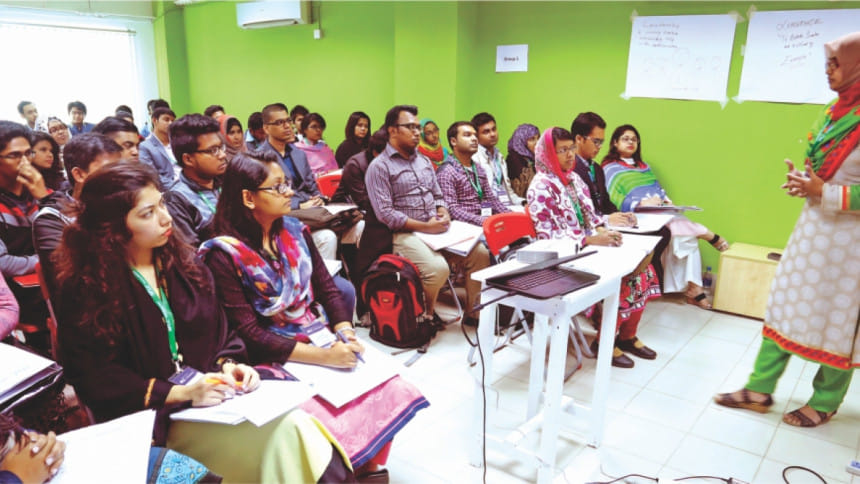Readying the Future Today

Photo: courtesy
Can leadership be taught in a classroom? We are confronted with this question every day when we teach leadership to a diverse group of enthusiastic young students at Bangladesh Youth Leadership Center (BYLC). Leadership is a generic term that everyone has an opinion about, which makes the job of teaching leadership all the more challenging.
On the days I am scheduled to show up before the class, I remain anxious, worried, and excited —all at the same time. The anxiety stems from the fact that there is no concrete structure to the lessons and I cannot control the outcome, since we are teaching some abstract concepts, and everyone has different learning needs. How I envy my medical Professors then, who can easily prepare a powerpoint presentation and deliver their lectures without batting an eyelid! But leadership cannot be scripted and requires a certain level of experimentation, where I have to let go of some of the control. And this uncertainty, is what makes every class a unique challenge.
To be able to conduct a leadership session that entails flexibility instead of certainty, I need to prepare myself well, so I begin the night before. Having a conversation with the rest of the teaching team and checking the answer scripts of the students, I do a comparative analysis of what the students need to learn, what will help them at this stage and, what they are ready to take on. That is a tricky thing to do, as all the subsets do not always merge to a point. It is a risk even if they do, as I need to go to the class with a toolkit that can handle the pressure, if such topics come up that are different from what I prepared. Roughly tallying up the suitable topics, I delve into those chapters of the books 'Leadership on the Line' and 'The Practice of Adaptive Leadership,' which are used as part of our curriculum at BYLC. Reading these books is almost like diving into the sea and observing things that we cannot see from above the surface. With the perspectives gained and the insights stacked up, I make a mental plan of what I would share with my students the next day and what I'd want them to think about during and after the class. By the time I map it, I've already overshot my sleeping schedule. I sleep on it, so that I may try and wake up to catch my morning classes.
As soon as I finish my classes at DMC, I rush to BYLC. This being a 2-hour journey, I use my time to look out on the streets, observe the people and try to match real-life examples with the concepts to be taught in class. I notice how our stifling traffic problem has much to do with our adaptive challenge of following traffic rules. I note that Dhaka could be a much cleaner city if every individual decided not to throw thrash out the window. I make a mental note of these observations to use as examples in class in order to help the students relate better.
My test begins once I stand before the classroom. Getting the students to unlearn some of their deeply held beliefs, and enabling them to better understand the gap between their values and the reality are tricky things to accomplish, especially when there are no text books or bullet points to memorise. Though unconventional, I have found this style of teaching highly effective when I myself was a BBLT participant and realise that it is much needed in traditional classrooms.
We believe that leaders are made not born. That leadership can indeed be taught. But the job of teaching leadership is demanding, more so because it cannot be scripted. Bringing alive the concepts in the classroom is a process I am learning every day. But every time I see a beaming graduate talk passionately about making change, or highlight some of the concepts I teach in their speeches and presentations, I know that I am making a difference. We are working to prepare the next generation of home-grown leaders, who can make great positive impact through their various roles in the public, private, and non-profit sectors. It is a rewarding experience, knowing that what I do will shape how the future of Bangladesh will look.
The writer is a graduate of the eighth Building Bridges through Leadership programme, is a final year student at Dhaka Medical College and a Teaching Assistant at BYLC[e1].

 For all latest news, follow The Daily Star's Google News channel.
For all latest news, follow The Daily Star's Google News channel. 



Comments